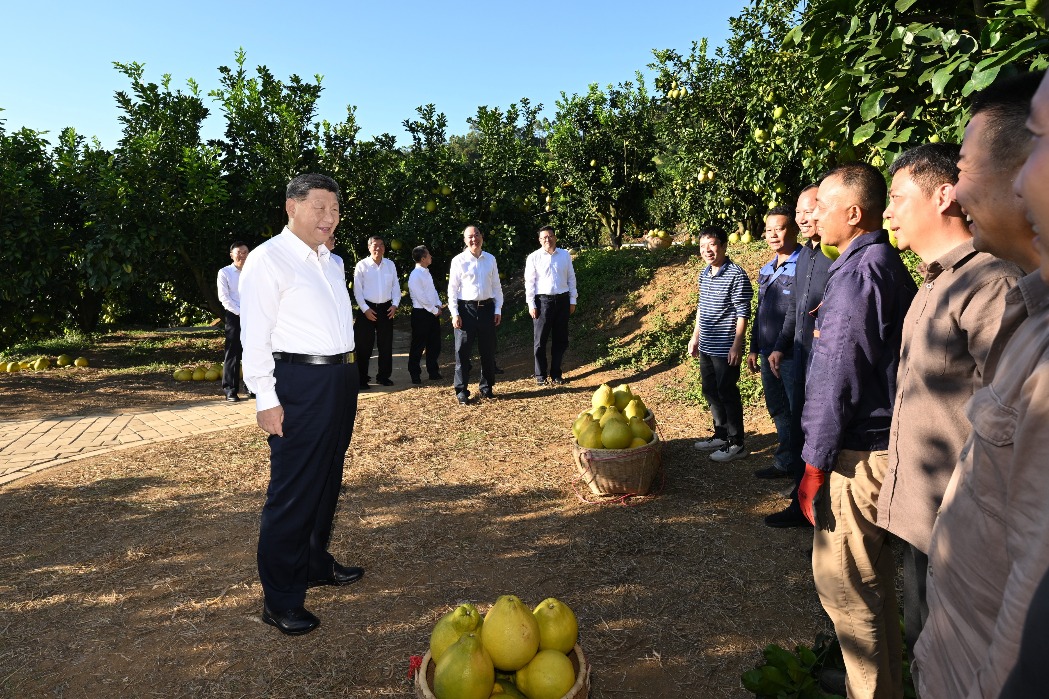Sound trade policy a boon for US


Former US president Donald Trump has won the presidential election and will be sworn in as the 47th US president on Jan 20. President Xi Jinping on Thursday extended congratulations to Donald Trump on his election as president of the United States.
Xi urged the two countries to find the right way to get along in the new era, so as to benefit both countries and the wider world. The statements made by the Chinese leader indicate the correct path that the world's two largest economies should follow. Hopefully, both the current US president and the president-elect will take heed of such suggestions.
In particular, the US has imposed tariffs on more than $300 billion worth of Chinese goods since 2018. It's a big concern that during the election campaign, Trump threatened to impose 60 percent tariffs on imports from China (worth about $427 billion in 2023) and 10 percent tariffs on all imports (worth more than $3 trillion).
However, it should be noted that many US presidents have prioritized practical measures over impractical election pledges after being sworn in.
Tariffs are never a "panacea" for all the economic and social ills of the US. Can tariffs help boost domestic manufacturing, increase national wealth, compensate for the loss of government revenue due to tax cuts, pay for childcare, and even combat inflation? Can tariffs on Chinese products have helped bring manufacturing and employment back to the US?
Even US economists have dismissed such claims as being exaggerated, unsubstantiated and logically fallible. In fact the tariffs failed to boost US manufacturing and, instead, cost more jobs than they created. Among the studies are those by the Tax Foundation and US-China Business Council, as well as some other prominent economists including David Autor at the economics department of the Massachusetts Institute of Technology.
The study by Autor and others — basically, the same team that conducted a study on the "China shock" — is particularly interesting, as it found that the tariffs failed to achieve their goal of bringing jobs back to the US. Due to other countries' retaliation, the cumulative effect of Trump's tariffs — that is, the effect of the original tariffs, retaliatory tariffs and subsidies granted to farmers — was slightly negative for US jobs.
Also, some economists agree that the proposed broad-based tariffs may increase the cost of entry for overseas competitors and thus reduce imports, encouraging some US enterprises to increase their production. But studies show the tariffs would raise the costs for US manufacturers and businesses that depend on foreign inputs.
Contrary to the claim that China will pay the cost of those tariffs, not US consumers, numerous studies have shown that the costs of tariffs were, in reality, borne by Americans as a whole, if not only consumers. According to a 2018 study led by Mary Amiti of the Federal Reserve Bank of New York, the extra tariffs "had little to no impact on the prices received by foreign exporters". Importers, too, had to pay part of the cost of the tariffs, as their profit margins shrunk.
There's no doubt any new tariffs would increase the costs for consumers. Kimberly Clausing and Mary Lovely of the Peterson Institute estimate the annual cost for a typical US household to be about $2,600, while Budget Lab at Yale puts the extra cost at $1,900 to $7,600 per household.
Therefore as to the claim that "smart tariffs will not create inflation", and would even "combat inflation", economists say it is completely untenable. Autor at the MIT said the proposal to impose tariffs will have "a very large effect on prices almost immediately", which, in turn, could trigger a recession.
Besides, according to a study by the Peterson Institute, the proposed policy combination — import tariffs, deportation of illegal immigrants and efforts to erode the US Federal Reserve's independence — will drive up consumer prices. To be precise, the inflation rate, which otherwise would have been 1.9 percent in 2026, is projected to reach between 6 percent and 9.3 percent if tariff threat is realized.
Many Americans see tariffs as a remedy for the country's economic ills, because the US' manufacturing sector has been hollowed out, and inflation remains a big concern. But economists have been warning that extra tariffs increase commodity costs and raise inflation, hurting ordinary people. In a country whose supply chains are spread across the world and where labor costs are rising, extra tariffs on imports alone cannot bring manufacturing back or solve the problems facing US manufacturing. As a matter of fact, protectionist tariff policies will, more likely than not, exacerbate economic instability and increase economic costs.
Also, over-reliance on tariffs could result in higher living costs and increase the inflationary pressure on the people, ultimately undermining the health of the US economy. So policymakers should adopt a more rational approach to evaluating the long-term impacts of tariffs, temper protectionist impulses and strike a balance between increasing employment and maintaining the stability of the global supply chains, so as to ensure sustainable development.
The author is president of the University of International Business and Economics, Beijing. The views don't necessarily represent those of China Daily.
If you have a specific expertise, or would like to share your thought about our stories, then send us your writings at opinion@chinadaily.com.cn, and comment@chinadaily.com.cn.


































